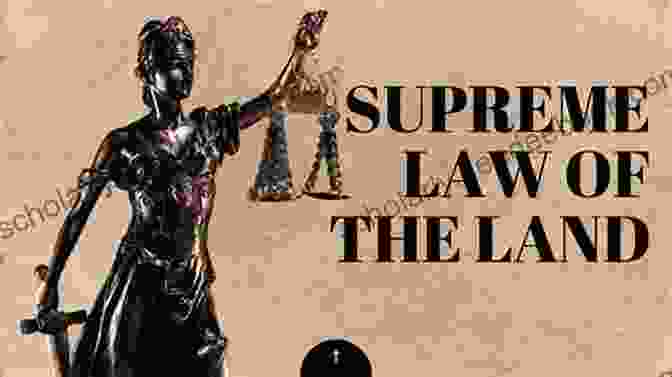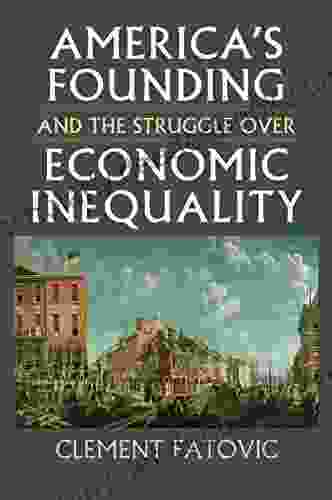America's Founding and the Struggle Over Economic Inequality: A Constitutional Perspective


The United States was founded on the principles of liberty and equality, and its Constitution was designed to protect those principles for all citizens. However, the issue of economic inequality has been a persistent challenge throughout American history, and it has often been the subject of constitutional debate.
5 out of 5
| Language | : | English |
| File size | : | 1964 KB |
| Text-to-Speech | : | Enabled |
| Enhanced typesetting | : | Enabled |
| Word Wise | : | Enabled |
| Print length | : | 365 pages |
| Screen Reader | : | Supported |
In this article, we will explore the origins of economic inequality in the United States, its impact on the country's development, and the ways in which the Constitution has been used to address this issue. We will also discuss the current state of economic inequality in the United States and the challenges that the country faces in addressing this problem.
The Origins of Economic Inequality in the United States
The roots of economic inequality in the United States can be traced back to the country's founding. The original settlers of the United States were largely made up of farmers and laborers, and there was relatively little economic stratification. However, as the country grew and industrialized, a wealthy elite emerged, and the gap between the rich and the poor widened.
One of the factors that contributed to economic inequality in the United States was the country's rapid industrialization. The Industrial Revolution created new opportunities for wealth creation, but it also led to the concentration of wealth in the hands of a few powerful individuals. The robber barons of the Gilded Age, such as John D. Rockefeller and Andrew Carnegie, amassed vast fortunes through their control of industries such as oil, steel, and railroads.
Another factor that contributed to economic inequality in the United States was the country's immigration policy. In the 19th and early 20th centuries, millions of immigrants came to the United States in search of a better life. Many of these immigrants were poor and uneducated, and they often worked in low-paying jobs. This influx of cheap labor helped to depress wages and increase profits for the wealthy elite.
The Impact of Economic Inequality on the United States
Economic inequality has had a profound impact on the development of the United States. It has led to social stratification, political instability, and economic crises.
Social stratification is the division of society into different classes based on their economic status. In the United States, the gap between the rich and the poor has created a rigid class structure, with the wealthy class having access to power, resources, and opportunities that are denied to the poor class. This class division has led to social unrest and conflict throughout American history.
Political instability is another consequence of economic inequality. When the gap between the rich and the poor is too wide, it becomes difficult to maintain social cohesion. The poor may become resentful of the wealthy, and they may be tempted to use violence to overthrow the existing order. This tension between the classes has often led to political instability and violence in the United States.
Economic crises are another consequence of economic inequality. When the gap between the rich and the poor is too wide, it can lead to a decline in economic growth. The poor may not have the resources to purchase goods and services, and this can lead to a decrease in demand. This decrease in demand can then lead to a decrease in production and employment, which can ultimately lead to an economic crisis.
The Constitution and Economic Inequality
The Constitution was designed to protect the rights of all citizens, regardless of their economic status. However, the issue of economic inequality has been a persistent challenge throughout American history, and it has often been the subject of constitutional debate.
One of the most important provisions of the Constitution that has been used to address economic inequality is the Equal Protection Clause of the Fourteenth Amendment. The Equal Protection Clause prohibits states from denying any person "the equal protection of the laws." This clause has been used to strike down laws that discriminate against the poor and to provide equal access to education, housing, and other essential services.
Another important provision of the Constitution that has been used to address economic inequality is the Commerce Clause of Article I. The Commerce Clause gives Congress the power to regulate interstate commerce. This clause has been used to protect the rights of workers and consumers, and to prevent businesses from using their market power to harm competition.
The Constitution is a living document that has been interpreted in different ways over time. As a result, the issue of economic inequality has been addressed in different ways at different times in American history. In some periods, the Constitution has been used to promote economic equality, while in other periods it has been used to protect the rights of the wealthy.
The Current State of Economic Inequality in the United States
Economic inequality in the United States is a serious problem that has been growing worse in recent decades. The gap between the rich and the poor is now wider than it has been at any time since the Gilded Age.
The top 1% of income earners in the United States now own more wealth than the bottom 90% of income earners combined. This concentration of wealth at the top has led to a decline in economic mobility and a decrease in the standard of living for the middle class.
The current state of economic inequality in the United States is a threat to the country's future. It is essential that the country find ways to address this problem and create a more just and equitable society.
Challenges to Addressing Economic Inequality
There are a number of challenges to addressing economic inequality in the United States. One challenge is the political power of the wealthy. The wealthy class has a great deal of influence over the political process, and they have used that influence to protect their economic interests.
Another challenge to addressing economic inequality is the lack of public understanding of the issue. Many people do not understand the extent of economic inequality in the United States, and they do not believe that it is a serious problem. This lack of understanding makes it difficult to build support for policies that would address economic inequality.
Finally, there is the challenge of finding effective solutions to the problem of economic inequality. There is no easy solution to this problem, and any solution will likely require a combination of policies. It is important to continue to research and debate different ideas and to find solutions that are effective and fair.
Economic inequality is a serious problem that has been a persistent challenge throughout American history. The Constitution has been used in different ways over time to address this issue, but the problem remains a serious threat to the country's future. It is essential that the country find ways to address this problem and create a more just and equitable society.
There are a number of challenges to addressing economic inequality in the United States, but these challenges must be overcome if the country is to create a more just and prosperous future for all of its citizens.
5 out of 5
| Language | : | English |
| File size | : | 1964 KB |
| Text-to-Speech | : | Enabled |
| Enhanced typesetting | : | Enabled |
| Word Wise | : | Enabled |
| Print length | : | 365 pages |
| Screen Reader | : | Supported |
Do you want to contribute by writing guest posts on this blog?
Please contact us and send us a resume of previous articles that you have written.
 Page
Page Chapter
Chapter Text
Text Story
Story Paperback
Paperback E-book
E-book Magazine
Magazine Paragraph
Paragraph Sentence
Sentence Shelf
Shelf Glossary
Glossary Foreword
Foreword Synopsis
Synopsis Annotation
Annotation Manuscript
Manuscript Scroll
Scroll Codex
Codex Bestseller
Bestseller Classics
Classics Library card
Library card Narrative
Narrative Autobiography
Autobiography Memoir
Memoir Encyclopedia
Encyclopedia Thesaurus
Thesaurus Narrator
Narrator Character
Character Librarian
Librarian Card Catalog
Card Catalog Borrowing
Borrowing Lending
Lending Rare Books
Rare Books Special Collections
Special Collections Interlibrary
Interlibrary Literacy
Literacy Thesis
Thesis Dissertation
Dissertation Awards
Awards Reading List
Reading List Theory
Theory Aleksandra Bystry
Aleksandra Bystry Bell Hooks
Bell Hooks S Briones Lim
S Briones Lim S J Watson
S J Watson Marty Godbey
Marty Godbey Dr Dave Cambrigton
Dr Dave Cambrigton Jo Freeman
Jo Freeman Kathy Duval
Kathy Duval Jeff Leighton
Jeff Leighton Katy Evans
Katy Evans Lesley Williams
Lesley Williams Mohan Pandey
Mohan Pandey Marcus Garvey
Marcus Garvey Michael Ferrari
Michael Ferrari Linda Lael Miller
Linda Lael Miller V D Bucket
V D Bucket June Abernathy
June Abernathy S A Kader
S A Kader Woon Chia Liu
Woon Chia Liu Rick Mckeon
Rick Mckeon
Light bulbAdvertise smarter! Our strategic ad space ensures maximum exposure. Reserve your spot today!

 Thomas MannOrthopaedic Neurology: Exploring the Complexities of Movement Disorders with...
Thomas MannOrthopaedic Neurology: Exploring the Complexities of Movement Disorders with... Ezekiel CoxFollow ·11.5k
Ezekiel CoxFollow ·11.5k Haruki MurakamiFollow ·18.8k
Haruki MurakamiFollow ·18.8k Joseph FosterFollow ·17.4k
Joseph FosterFollow ·17.4k Eugene ScottFollow ·19.7k
Eugene ScottFollow ·19.7k Eric NelsonFollow ·13.6k
Eric NelsonFollow ·13.6k Kenneth ParkerFollow ·19.8k
Kenneth ParkerFollow ·19.8k Julio CortázarFollow ·17.8k
Julio CortázarFollow ·17.8k Maurice ParkerFollow ·13.6k
Maurice ParkerFollow ·13.6k

 Houston Powell
Houston PowellMusorgsky and His Circle: A Russian Musical Revolution
Modest Mussorgsky was a Russian...
 Barry Bryant
Barry BryantRanking the 80s with Bill Carroll: A Nostalgic Journey...
Prepare to embark on a captivating...

 Kelly Blair
Kelly BlairThe Diplomat's Travel Guide to Festivals, Holidays, and...
India is a land of vibrant culture and...

 José Saramago
José SaramagoFancy Nancy Nancy Clancy: Late-Breaking News!
Nancy Clancy is back with all-new adventures...

 Trevor Bell
Trevor BellGestalt Psychotherapy and Coaching for Relationships: A...
Relationships...

 Federico García Lorca
Federico García LorcaThe Last Love of George Sand: An Enduring Legacy of...
At the twilight of her remarkable life,...
5 out of 5
| Language | : | English |
| File size | : | 1964 KB |
| Text-to-Speech | : | Enabled |
| Enhanced typesetting | : | Enabled |
| Word Wise | : | Enabled |
| Print length | : | 365 pages |
| Screen Reader | : | Supported |










